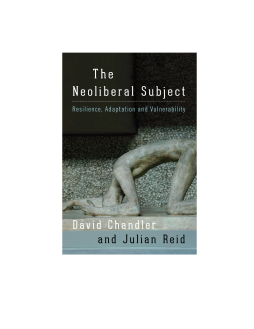
Additional Information
Book Details
Abstract
Political practices, agencies and institutions around the world promote the need for humans, individually and collectively, to develop capacities of resilience. We must accept and adapt to the ‘realities’ of an endemic condition of global insecurity and to the practice of so-called sustainable development. But in spite of claims that resilience make us more adept and capable, does the discourse of resilience undermine our ability to make our own decisions as to how we wish to live?
This book draws out the theoretical assumptions behind the drive for resilience and its implications for issues of political subjectivity. It establishes a critical framework from which discourses of resilience can be understood and challenged in the fields of governance, security, development, and in political theory itself. Each part of the book includes a chapter by David Chandler and another by Julian Reid that build a passionate and provocative dialogue, individually distinct and offering contrasting perspectives on core issues. It concludes with an insightful interview with Gideon Baker. In place of resilience, the book argues that we need to revalorize an idea of the human subject as capable of acting on and transforming the world, rather than being cast in a permanent condition of enslavement to it.
“[T]he book provides an important and fascinating excursion into the largely neglected concepts of resilience, adaptation, and vulnerability in neoliberal regimes, international relations theory, and philosophy.”
The Neoliberal Subject offers a timely and trenchant dialogue on neoliberalism from two of the world’s most incisive critical international relations theorists. It adds immeasurable depth to the debate on neoliberalism, revealing its resonance with the widely popular categories of vulnerability, resilience and adaptation. A must read for any serious reader of contemporary precariousness and the political economies of risk and global environmental change.
Andrew Baldwin, Associate Professor in Human Geography, Durham University
This fantastic book is centred on debates about how people understand themselves and their relations to the world. The back and forth discussion gets to the heart of current issues like resilience – with its doubtful, vulnerable and dependent subjects. At a time when the liberal subject appears shrunk and degraded, this timely debate somehow tries to find hope that there are more creative and fulfilling alternatives.
Jonathan Joseph, Professor of Politics, The University of Sheffield
Should you read this book? Absolutely. It’s an invaluable discussion of how immanence and government coincide in our Janus-faced present, a trenchant analysis of liberal resilience modes of government and what they demand of our souls, and is a confident expression of what a new, destituted humanism could be.
This most unusual of books stands united against the enemy of the diminished subject of neoliberalism found in the apologias of resilience and adaptation. Its authors however engage in a friendly but spirited rivalry over the origins of this subject and the alternatives to it. The result is an important radical debate on the potentials and risks of contemporary political reason and imagination.
Mitchell Dean, Professor of Public Governance, Copenhagen Business School
David Chandler is Professor of International Relations and Director of the Centre for the Study of Democracy at the University of Westminster, UK. He was the founding editor of the Journal of Intervention and Statebuilding and currently edits the journal Resilience: International Policies, Practices and Discourses. He also edits two book series: Studies in Intervention and Statebuilding and Advances in Democratic Theory.
Julian Reid is Chair and Professor of International Relations at the University of Lapland, Finland. He is co-author of Resilient Life: The Art of Living Dangerously, The Liberal Way of War: Killing to Make Life Live and author of Biopolitics of the War on Terror.
Table of Contents
| Section Title | Page | Action | Price |
|---|---|---|---|
| Contents | 7 | ||
| Introduction | 9 | ||
| 1 Debating Neoliberalism | 17 | ||
| 2 Debating Neoliberalism | 25 | ||
| I: Resilience | 33 | ||
| 3 Resilience | 35 | ||
| 4 Resilience | 59 | ||
| II: Adaptation | 81 | ||
| 5 Development as Adaptation | 83 | ||
| 6 Adaptation | 107 | ||
| III: Vulnerability | 127 | ||
| 7 The Self-Construction of Vulnerability | 129 | ||
| 8 Embodiment as Vulnerability | 153 | ||
| Conclusion | 175 | ||
| Bibliography | 193 | ||
| Index | 207 |
